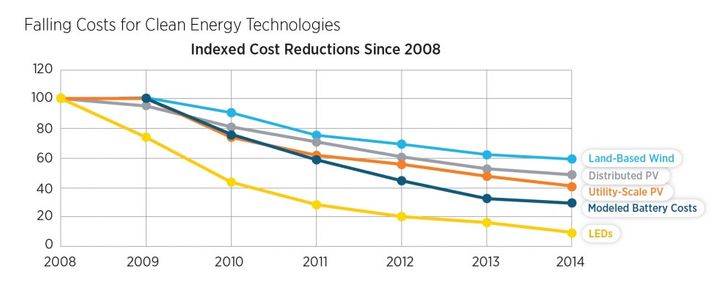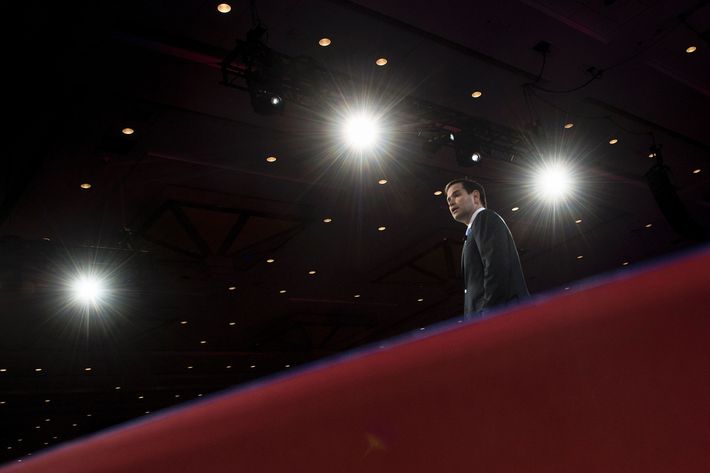
During Thursday night’s Republican debate, a moderator — finally! — asked about climate change, and Marco Rubio supplied an answer that, while banal and dogmatic, was fascinating in its own way. The regular Republican policy apparatus has been frozen for nearly a year as its Establishment has desperately fended off the Trump insurgency. Presented with a plea from Miami’s Republican mayor, whose city is already coping with the flooding that results from elevated sea levels, Rubio repeated his formulaic and un-categorical opposition to any policy to limit the greenhouse-gas emissions that are in the process of sinking his home city. Rubio’s reply was not just the last gasp of a dying campaign, but a state-of-the-art expression of party doctrine. Trump is what the regular Republicans are trying to stave off; Rubio represents what they are fighting to preserve: a delusional anti-government ideology unable to process or cope with real-world conditions.
His climate-change response, in particular, recapitulated almost word for word the denialist stance he has stubbornly maintained for years, as though nothing has changed. A casual listener might have gotten the impression that the world Rubio is describing, or mis-describing, is more or less the same one that existed a few years ago. But it isn’t. It is in the midst of a green-energy revolution that is proceeding with astonishing and increasing speed, and rendering the backward orthodoxy mouthed by Rubio increasingly comic.
Rubio’s argument contains three parts. First, even when twice asked to do so, he refuses to accept the theory of anthropogenic global warming, which is the consensus belief held by climate scientists that the release of heat-trapping gasses into the atmosphere leads to warmer temperatures. Climate-science deniers have spent years and years feebly picking apart the theory, seizing upon ambiguities or any possible grounds for doubt. Rubio has clung to this line, claiming as recently as 2014 that global temperatures “have stabilized.” In the last few months, though, the world has seen confirmation that 2015 was the hottest year in recorded history, and then, in February, the most unusually warm month ever recorded. Amazingly, Rubio continues to maintain this is all just a bunch of stuff that happens with no discernible pattern, insisting, “There’s never been a time when the climate has not changed,” and dismissing efforts to limit greenhouse-gas emissions as a futile effort to “change the weather,” using a favorite sneer for climate-science skeptics, who conflate weather with climate.
Second, Rubio repeated his insistence that the Obama administration’s climate policies, or any policies designed to seriously mitigate greenhouse-gas emissions, would create prohibitive costs:
There are laws they want to us pass that would be devastating for our economy or these programs like what the president has put in with the Clean Power Act or all these sorts of things that he’s forcing down our throats on the war on coal. … they will hurt and devastate our economy. … I am not going to destroy the U.S. economy for a law that will do nothing for our environment.
Even allowing generously for hyperbole, Rubio’s description is as delusional as right-wing predictions of hyperinflation and Greek-style collapse during Obama’s first term. Literally nothing of the sort has taken place. Energy prices have been completely stable. That is because the green-technology subsidies in the stimulus, combined with a wave of tough regulations on the production and use of carbon, have driven a wave of green-technology innovation. Major new clean-energy technologies — wind, solar, batteries, LEDs — have plummeted in cost:

All of these innovations have allowed the economy to decarbonize quickly without imposing noticeable costs on consumers. The coal industry is in a state of collapse. In just the last year alone, its share of U.S. electrical generation fell from 36 percent to 28 percent. The four largest American coal-mining firms, which were worth a combined $34 billion five years ago, are now worth $150 million — a loss of more than 99 percent of their value.
In recent years, natural gas (which emits much less carbon than coal) has accounted for most of the decline. But the electricity sector is rapidly transitioning into zero-carbon sources. Solar and wind accounted for more than two-thirds of all new electric capacity last year. As these technologies rapidly grow cheaper and more efficient, their spread is accelerating. By the end of 2016, the U.S. solar market will be ten times as large as it was in 2010.
It is not only the power sector that is responding. The auto sector is on the verge of rolling out electric cars that are fully price-competitive with gasoline-powered versions. Tesla, Chevy, and Nissan all have plans to roll out long-range electric cars in the $30,000 price range within the next few years. Electric cars are on pace to reach full parity without any subsidies within a half-dozen years. (And, as the electricity powering these vehicles transitions from coal to gas, solar, and wind, the carbon savings of switching to electric cars will continue to rise.)

Rubio’s third argument is that the (imaginary) crippling effects of reducing greenhouse-gas emissions will bring no benefit, since other countries will never reciprocate:
And you know what passing those laws would have – what impact it would have on the environment? Zero, because China is still going to be polluting and India is still going to be polluting at historic levels … these other countries like India and China are more than making up in carbon emissions for whatever we could possibly cut.
When Republican leaders used this argument against cap-and-trade in 2010, it was a pessimistic read of the international climate scene. Today it is as utterly delusional as insisting Stephen Curry could never make it in the NBA. Obviously, in December, the first-ever global climate-change pact was signed. Conservatives dismiss this, and almost any international treaty, as hopelessly unworkable. But growing mountains of actual evidence show that the world is, if anything, decarbonizing even more rapidly than promised in Paris. Worldwide greenhouse-gas emissions fell in 2015 — the first time they have ever dropped in a period of significant economic growth. China — whose rapidly growing emissions made it the justifiable focus of worldwide climate diplomacy — has particularly exceeded expectations. Not long ago, it had officially promised to cap its greenhouse-gas emissions in 2040. Two years ago, it agreed to move its peak emissions date up to 2030. In Paris, it moved the date up again, to 2025. A report last week from the London School of Economics suggests that China’s emissions may have already peaked — a success far beyond the most optimistic hopes even a few years ago. (China’s economic statistics are not always reliable, but the underlying factors driving its emissions — massive new investments in clean energy sources, a steep drop-off in its coal-burning heavy industry — are relatively transparent.)
The green-energy revolution is really two revolutions acting in tandem: an increase in political willpower, and the rise of new technologies to reduce carbon usage. The two forces interact with each other in powerful ways. As elected officials commit to emissions reductions, the market invests in clean energy technologies, bringing down their price; and as transitioning to lower emissions gets cheaper and more convenient, elected officials can promise deeper reductions still. Rubio revealed the mind-set of a party that remains fully in denial of all this — not just the science but the diplomatic and technological transformation now well under way. The horror of the populist insurgency besieging the GOP from its perimeter has diverted attention from the deep intellectual rot at its core.






























